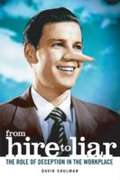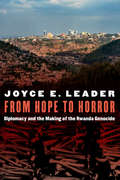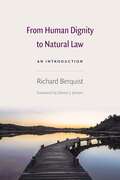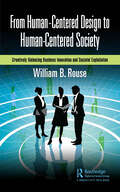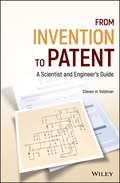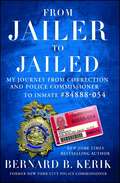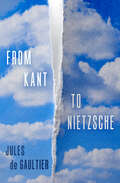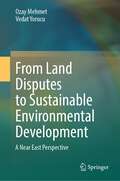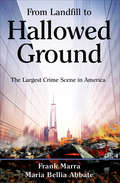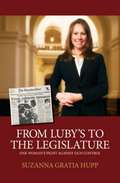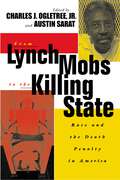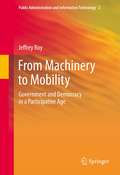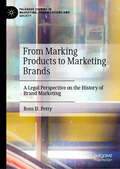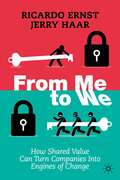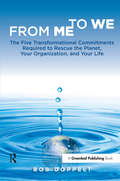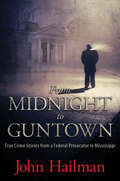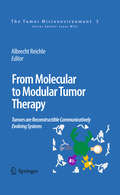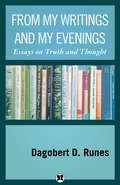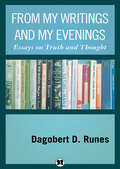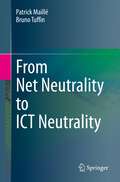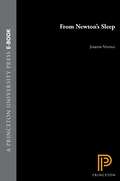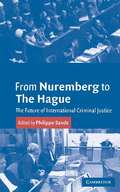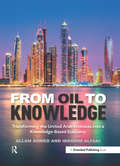- Table View
- List View
From Hire to Liar: The Role of Deception in the Workplace
by David ShulmanThis book offers a sociological study of the rationales for, and methods of, workplace deception. The author begins by presenting an ethnographic analysis of private detectives' routine use of deception as an officially-sanctioned component of their work. He then uses interviews and case-studies to show how similar strategies are used in a variety of other work environments. The author discusses the justification and effects of workplace deception on both workers and employers.
From Hope to Horror: Diplomacy and the Making of the Rwanda Genocide
by Joyce E. LeaderAs deputy to the U.S. ambassador in Rwanda, Joyce E. Leader witnessed the tumultuous prelude to genocide—a period of political wrangling, human rights abuses, and many levels of ominous, ever-escalating violence. From Hope to Horror offers her insider&’s account of the nation&’s efforts to move toward democracy and peace and analyzes the challenges of conducting diplomacy in settings prone to—or engaged in—armed conflict. Leader traces the three-way struggle for control among Rwanda&’s ethnic and regional factions. Each sought to shape democratization and peacemaking to its own advantage. The United States, hoping to encourage a peaceful transition, midwifed negotiations toward an accord. The result: a revolutionary blueprint for political and military power-sharing among Rwanda&’s competing factions that met categorical rejection by the &“losers&” and a downward spiral into mass atrocities. Drawing on the Rwandan experience, Leader proposes ways diplomacy can more effectively avert the escalation of violence by identifying the unintended consequences of policies and emphasizing conflict prevention over crisis response. Compelling and expert, From Hope to Horror fills in the forgotten history of the diplomats who tried but failed to prevent a human rights catastrophe.
From Human Dignity To Natural Law: An Introduction
by Richard Berquist Steven J. JensenFrom Human Dignity to Natural Law shows how the whole of the natural law, as understood in the Aristotelian Thomistic tradition, is contained implicitly in human dignity. Human dignity means existing for one's own good (the common good as well as one's individual good), and not as a mere means to an alien good. But what is the true human good? This question is answered with a careful analysis of Aristotle's definition of happiness. The natural law can then be understood as the precepts that guide us in achieving happiness. To show that human dignity is a reality in the nature of things and not a mere human invention, it is necessary to show that human beings exist by nature for the achievement of the properly human good in which happiness is found. This implies finality in nature. Since contemporary natural science does not recognize final causality, the book explains why living things, as least, must exist for a purpose and why the scientific method, as currently understood, is not able to deal with this question. These reflections will also enable us to respond to a common criticism of natural law theory: that it attempts to derive statements of what ought to be from statements about what is.
From Human-Centered Design to Human-Centered Society: Creatively Balancing Business Innovation and Societal Exploitation
by William B. RouseA human-centered society creatively balances investments in sources of innovation, while also governing in a manner that eventually limits exploitation by originators once innovations have proven their value in the marketplace, broadly defined to include both private and public constituencies. The desired balance requires society to invest in constituencies to be able to create innovations that provide current and future collective benefits, while also assuring society provides laws, courts, police, and military to protect individual rights to life, liberty, and the pursuit of happiness. The balance addresses collectivism vs. individualism. Collectivism emphasizes the importance of the community. Individualism, in contrast, is focused on the rights and concerns of each person. Unity and selflessness or altruism are valued traits in collectivist cultures; independence and personal identity are central in individualistic cultures. Collectivists can become so focused on collective benefits that they ignore sources and opportunities for innovation. Individualists can tend to invest themselves, almost irrationally, in ideas and visions, many of which will fail, but some will transform society. Collectivists need to let individualists exploit their successful ideas. Individualists need to eventually accept the need to provide collective benefits. This book addresses the inherent tension underlying the pursuit of this balance. It has played a central role in society at least since the Industrial Revolution (1760–1840). Thus, the story of this tension, how it regularly emerges, and how it is repeatedly resolved, for better or worse, is almost a couple of centuries old. Creating a human-centered society can be enabled by creatively enabling this balance. Explicitly recognizing the need for this balance is a key success factor. This book draws upon extensive experiences within the domains of transportation and defense, computing and communications, the Internet and social media, health and wellness, and energy and climate. Balancing innovation and exploitation takes varying forms in these different domains. Nevertheless, the underlying patterns and practices are sufficiently similar to enable important generalizations.
From Invention to Patent: A Scientist and Engineer's Guide
by Steven H. VoldmanInvention and patents continues to be an important issue in technology and our global economy. Invention and Patenting provides a clear picture of how to be a prolific inventor, to understand patents, and the patent process. It provides an illuminating insight into the writing of invention disclosures to patents from the submission process to final drafts. The book shows how to communicate effectively with patent lawyers and patent examiners, teaching the language of “legalese.” This book is unique in covering both the early invention process to final patent drafting to provide high quality patents in technologies. Key features include: How to become an inventor, how to invent, to what is invention; How to write an invention disclosure to writing a patent; Examples of utility, design, and plant patents; How to prepare the background section, brief listing of figures, detailed description of the invention, claims, abstract to artwork; Using patent search engines; Writing independent and dependent claims; Analyzing office actions of the US and European patent offices; How to write an office action response and amending claims; and, Examples of Office Action responses, preliminary amendments, to notice of allowance response; Invention and Patenting is the first book by an engineer and inventor from a technologist’s point of view. It is an essential reference for engineers and inventors. It is also useful for graduate and undergraduate students in technology and the sciences.
From Jailer to Jailed
by Bernard B. KerikThe controversial New York City police commissioner and bestselling author of The Lost Son shares the story of his fall from grace and the effects of his incarceration on his views of the American justice system.Bernard Kerik was New York City's police commissioner during the 9/11 attacks, who became an American hero as he led the NYPD through rescue and recovery efforts of the World Trade Center. His résumé as a public servant is long and storied, and includes honors from President Ronald Reagan, Queen Elizabeth II, and the NYPD's Medal for Valor for saving his partner in a gun battle. In 2004, Kerik was nominated by President George W. Bush to head the US Department of Homeland Security. Now, he is a former Federal Prison Inmate known as #84888-054. Convicted of tax fraud and false statements in 2007, Kerik was sentenced to four years in federal prison. Now for the first time, in this hard-hitting, raw and oftentimes politically incorrect memoir, he talks candidly about his time on the inside: the torture of solitary confinement, the abuse of power, the mental and physical torment of being locked up in a cage, the powerlessness. With his newfound perspective, Kerik makes a plea for change and illuminates why our punishment system doesn't always fit the crime. In this extraordinary memoir, Kerik offers a riveting, one-of-a-kind perspective on the American penal system as he details life on the inside with the experience of an acclaimed Correction Commissioner from the outside. With astonishing candor, bravery, and insider's intelligence, Bernard Kerik shares his fall from grace to incarceration, and turns it into an impassioned and singularly insightful rallying cry for criminal justice reform in a nation that he devoted his life to serving and protecting.
From Justice to Protection
by Miguel KottowIn most developed countries, the epidemiological disease profile has changed from infectious to degenerative, causing major alterations in epidemiological thinking and public health policies. Less developed nations have to deal with a more complex situation, because social disparities create highly unequal health conditions, the affluent being afflicted by degenerative conditions, whereas the poorer social segments continue to suffer infectious diseases, but also begin to feel the effects of chronic illness. At the turn of the 21st century, equity in health care is not being served, and social justice has lost credibility as a conceptual driving force of public health policies. Rampant injustice confirms that theories, reality and suggested practices of just social orders are flawed, leaving the needy without help or hope in a world of flagrant ethical inadequacy. And yet, mainstream bioethics loses meaning and relevance as it clings to the principle of justice and hails such concepts as global justice and universal health-care equity, misleadingly focusing on justice as a desideratum. This book pleads for an urgent turn towards directly addressing injustice as a reality that requires pressingly needed arguments and proposals to inspire realistic public health policies and programs based on an ethics of protection. Ever since Hobbes, all shades of political philosophy accept that the basic obligation of the ruling power is to protect its subjects. The ethics of protection emphasizes aiding the needy and the disempowered in obtaining access to basic goods and services related to health-care. Public health is called upon to fulfill protective obligations to guarantee disease prevention and medical services to the population, taking special care to safeguard those unable to cover their health-care needs in market-oriented medical services and institutions. The bioethics of protection developed in this text presents specific and explicit guide-lines to assure that protective public health actions be efficacious (problem-solving), efficient (sustainable cost/benefit relation) and ethically sound (respecting human rights and the common weal). These guide-lines are designed to give ethical support and justification to public health policies even when they require some unavoidable limitations of individual autonomy to promote social health benefits.
From Kant to Nietzsche
by Jules de Gaultier&“Schopenhauer contributed the concept of the will-to-live; Nietzsche that of the will-to-power; and de Gaultier that of the will-to-illusion.&” —Wilmot E. Ellis Can you construct your own reality? What if you don&’t trust your senses, but you want to live a happy, productive life? How should you make moral decisions? What do you believe to be true? Do you believe in a supreme being? How do you decide your moral compass? This work by the author of Le Bovarysme treats the tendency to think of things other than they are as a living source of art. Jules de Gaultier sees this sort of behavior not as a moral or ethical problem, but an aesthetic problem. His metaphysical position has a long and complicated history which can be traced back to the philosophical musings of Kant, Schopenhauer, and Nietzsche. This book was his first published work, and serves as a thought-provoking introduction to his philosophy.
From Land Disputes to Sustainable Environmental Development: A Near East Perspective
by Ozay Mehmet Vedat YorucuThis book is written to transform land disputes toward win-win outcomes utilizing the latest sustainable development theory. Land has always been a source of conflict, a contest of competing homelands and ideologies, but it can also act as an agency of peace-making, promoting economic and social development. This dualism will be the theme of this book as there is a dearth of studies exclusively focused on land. The book's coverage is comprehensive, examining land and property disputes with case studies in modern times along with a problem-solving approach utilizing such economic theorems as Location and Growth Poles theories. The UN’s Sustainable Development Goals will be used as our over-arching framework. The overall aim of the book is to transform land disputes toward win-win outcomes utilizing latest sustainable development theory.
From Landfill to Hallowed Ground: The Largest Crime Scene in America
by Frank Marra Maria Bellia AbbateAn NYPD sergeant shares his experiences in the tragic aftermath of 9/11 and the tireless search for remains among the debris of the Twin Towers.The morning of September 11, 2001, began like any other Tuesday for police Sergeant Frank Marra. He woke up early, brewed his coffee, and got his son Anthony ready for kindergarten. Then a shocking image interrupted televised broadcasts nationwide: the South Tower of the World Trade Center was engulfed in flames and smoke. Sergeant Marra stared in shock at what would become the largest crime scene he would ever investigate.Marra spent months at the Staten Island Landfill, where the 1.6 million tons of debris was searched for any form of evidence that could help identify the victims, including the remains of those buried beneath. Officers and volunteers worked tirelessly, often at great cost to themselves, to bring closure for so many grieving families. This heartrending story gives readers a rare and intimate glimpse into the days and months following the attack on September 11, and the stories that echo from &“The Hill&”—the hallowed ground of those who perished on that fateful day.
From Luby's To The Legislature: One Woman's Fight Against Gun Control
by Suzanna Gratia HuppOn October 16, 1991, Suzanna Gratia Hupp witnessed the tragic shooting of 23 people at Luby's Cafeteria in Killeen, Texas, among them her parents. Ironically she had decided against carrying a small revolver--that could have dramatically changed the day's events--in her purse that day out of a fear of losing her chiropractor's license if caught possessing a weapon. In this autobiography, she chronicles her evolution from a small-town chiropractor into a national icon for the right to armed self-defense. Her transformation into a high-profile, gun-rights activist began when her impassioned calls for the right of citizens to carry guns for self-protection thrust her into the middle of the gun-control debate. She repeatedly testified under oath against the ineffectiveness of gun-control laws that, in her opinion, disarmed law-abiding citizens, making them potential victims of criminals who did not obey the law. This position on gun legislation paved the way for a decade-long tenure as a member of the Texas House of Representatives, where, in addition to championing Second Amendment and privacy rights, she served as a member of the House Rural and Veterans and Military Affairs Caucuses, Chair of the House Select Committee on Child Welfare and Foster Care, and Chair of the Human Services Committee.
From Lynch Mobs to the Killing State: Race and the Death Penalty in America (The Charles Hamilton Houston Institute Series on Race and Justice #6)
by Charles J. Ogletree, Jr., and Austin SaratSituates the linkage between race and the death penalty in the history of the U.S.Since 1976, over forty percent of prisoners executed in American jails have been African American or Hispanic. This trend shows little evidence of diminishing, and follows a larger pattern of the violent criminalization of African American populations that has marked the country's history of punishment.In a bold attempt to tackle the looming question of how and why the connection between race and the death penalty has been so strong throughout American history, Ogletree and Sarat headline an interdisciplinary cast of experts in reflecting on this disturbing issue. Insightful original essays approach the topic from legal, historical, cultural, and social science perspectives to show the ways that the death penalty is racialized, the places in the death penalty process where race makes a difference, and the ways that meanings of race in the United States are constructed in and through our practices of capital punishment.From Lynch Mobs to the Killing State not only uncovers the ways that race influences capital punishment, but also attempts to situate the linkage between race and the death penalty in the history of this country, in particular the history of lynching. In its probing examination of how and why the connection between race and the death penalty has been so strong throughout American history, this book forces us to consider how the death penalty gives meaning to race as well as why the racialization of the death penalty is uniquely American.
From Machinery to Mobility
by Jeffrey RoyThe Westminster-stylized model of Parliamentary democratic governance is out of step with today's digitally and socially networked world. The resulting context for public sector governance brings both promise and peril - with profound consequences for public servants, elected officials, and citizens alike. This book presents a timely and thorough examination of the main sources of tension between the political and administrative foundations of the traditional state apparatus, commonly referred to as 'machinery', and newly emerging alternative governance mindsets and mechanisms driven by the advent of 'mobility'. Consistent with the emergence of Government 2.0, some of the critical technological and organizational dimensions of mobility include openness, cloud computing, privacy and security, and social media. Furthermore, a more informed, educated, and connected citizenry creates new pressures and opportunities for public engagement, particularly online. Blending conceptual and empirical perspectives from Canada and many other jurisdictions around the world, this book aims to provide scholars, students, and practitioners of democratic and public sector governance with fresh insight into both the prospects for reform and the critical choices that lie ahead for governments and citizens in an increasingly mobile and participative age.
From Marking Products to Marketing Brands: A Legal Perspective on the History of Brand Marketing (Palgrave Studies in Marketing, Organizations and Society)
by Ross D. PettyThis book examines the historical evolution from marking or branding products for ownership purposes to branding products in order to promote the brand itself. In the extreme, some modern brands so strongly promote their brand image or personality that there is little emphasis on promoting the branded products themselves. Central to this evolution is the development and protection of brand identifiers, such as names, logos, and more, as well as the development of registration and conflict-resolution systems to resolve disputes regarding brand identifier similarities. The author meticulously navigates the historical evolution of brand marketing, elucidating the manner in which this practice has evolved over time. To get a sense of how much brand marketing has grown, he examines advertising expenditures, the scholarly and professional literature, a few case studies, and the growing number of brand identifier registrations and disputes. He examines several legal areas including trademarks, unfair competition, copyrights, design patents and even antitrust law. In modern times, the legal system not only enables brand marketing but sets limits on it as well. The book concludes by examining some modern developments that are testing the limits. Catering to researchers vested in the realms of advertising and marketing history as well as law, this landmark text provides a thorough survey of brand marketing and its regulatory landscape.
From Me to We: How Shared Value Can Turn Companies Into Engines of Change
by Jerry Haar Ricardo ErnstShared value is a management strategy in which companies find business opportunities in social problems. While philanthropy and CSR focus efforts focus on “giving back” or minimizing the harm business has on society, shared value focuses company leaders on maximizing the competitive value of solving social problems in new customers and markets, cost savings, talent retention, and more.This book takes the concept of shared value to the next level, with the concept of “Me to We” (also abbreviated as “M2W”) and discusses the current state of the business-environment-government relationship and shows how the shared value model can contribute to each entity. Citing real cases and examples from multiple industries, the authors show that shared value promotes shareholder interests while serving as a successful business strategy. Chapters explore the emerging phenomenon of shared value, the shareholder-stakeholder comparisons, the role of government in the stakeholder environment, shared value as it related to competitiveness, and operational issues such as implementation, communication, and leadership in their relationship to shared value.Readers will find useful strategies of Me to We and its implementation by firms that have become leaders in their market. They will receive ideas and insights into business strategies that will overshadow CSR activities as a differentiation or brand development strategy of the past.Featuring interviews with corporate executives offering their perspectives on shared value, this book will discuss shared value within the context of business and society, competitiveness, and globalization.
From Me to We: The Five Transformational Commitments Required to Rescue the Planet, Your Organization, and Your Life
by Bob DoppeltIn From Me to We: The Five Transformational Commitments Required to Rescue the Planet, Your Organization, and Your Life, systems change expert Bob Doppelt reveals that most people today live a dream world, controlled by false perceptions and beliefs. The most deeply held illusion is that all organisms on Earth, including each of us, exist as independent entities. At the most fundamental level, the change needed to overcome our misperceptions is a shift from focusing only on "me" – our personal needs and wants – to also prioritizing the broader "we": the many ecological and social relationships each of us are part of, those that make life possible and worthwhile. Research shows that by using the techniques described in this book this shift is possible – and not that difficult to achieve. From Me to We offers five transformational "commitments" that can help you change your perspective and engage in activities that will help resolve today's environmental and social problems. Not coincidentally, making these commitments can improve the quality of your life as well. Bob Doppelt's latest book is a wake-up call to the creed of individualism. He calls for recognition of the laws of interdependence, cause and effect, moral justice, trusteeship, and free will. The book will be essential to all of those interested in how we can create and stimulate a sea change in how to enable the necessary behavioral change we need to deal with the myriad environmental and social pressures consuming the planet.
From Midnight to Guntown: True Crime Stories from a Federal Prosecutor in Mississippi
by John HailmanAs a federal prosecutor in Mississippi for over thirty years, John Hailman worked with federal agents, lawyers, judges, and criminals of every stripe. In From Midnight to Guntown, he recounts amazing trials and bad guy antics from the darkly humorous to the needlessly tragic. In addition to bank robbers—generally the dumbest criminals—Hailman describes scam artists, hit men, protected witnesses, colorful informants, corrupt officials, bad guys with funny nicknames, over-the-top investigators, and those defendants who had a certain roguish charm. Several of his defendants and victims have since had whole books written about them: Dickie Scruggs, Emmett Till, Chicago gang leader Jeff Fort, and Paddy Mitchell, leader of the most successful bank robbery gang of the twentieth century. But Hailman delivers the inside story no one else can. He also recounts his scary experiences after 9/11 when he prosecuted terrorism cases.
From Molecular to Modular Tumor Therapy:
by Albrecht ReichleThe traditional problem of the poor presentability as well as diagnostic and therapeutic practicability of individual patient care is still unresolved. The present book aims at leading the reader (cancer researchers, pharmacologists, biologists) away-in a scientifically accessible manner-from the daily conflicts between theory and practice and between the generalized and individual tumor patient, so that more personalized diagnostic and therapeutic strategies can be developed for controlling metastatic tumor disease: * First, recording the systems concept of tumor biology based on rather different sciences (biochemistry, cell biology, and medical oncology) including their potential contribution to communication, * then, giving reductionistically derived systems features an internal communicative context (formal-pragmatic communication theory), and * finally, binding the systems features to (tumor-immanent) evolutionary processes (modularity of biochemical and cellular processes,rat.
From Morality To Mental Health: Virtue And Vice In A Therapeutic Culture (Practical And Professional Ethics Ser.)
by Mike W. MartinMorality and mental health are now inseparably linked in our view of character. Alcoholics are sick, yet they are punished for drunk driving. Drug addicts are criminals, but their punishment can be court ordered therapy. The line between character flaws and personality disorders has become fuzzy, with even the seven deadly sins seen as mental disorders. In addition to pathologizing wrong-doing, we also psychologize virtue; self-respect becomes self-esteem, integrity becomes psychological integration, and responsibility becomes maturity. Moral advice is now sought primarily from psychologists and therapists rather than philosophers or theologians.
From My Writings and My Evenings
by Dagobert D. RunesIt is late in the evening and a philosopher wants to get words on paper. No grand project. No grand system of thought, just an attempt to get some things off his chest. Where would he turn his attention? Where would his thoughts lead him? Several catch phrases become crystallization points for his thoughts: thinking, the nature of man, the art of living, God and religion, Jews and anti-Semitism, crime and punishment, education, arts and science, language and literature, history and the state. Dagobert D. Runes put in much effort to avoid the pursuit of false ideas. In fact, the preface to From My Writings and My Evenings reads: "Hesitancy in judgment is the true mark of the thinker. Men think quite alike as they desire alike; if they were different, they could not co-exist even for a day. But most people judge by traditional or imitated judgment patterns, and snap judgments are the rule and the rulers." How is one to avoid the pitfalls apparent in such judgments, and still contribute to one's personal philosophy? If you are hesitant in your judgments, then what can you state that you believe to be unquestionably true? The result is a touching document of a philosopher who investigates many areas of man's endeavors, and who seeks to characterize what he judges to be the pure, true nature of these realms.
From My Writings and My Evenings: Essays on Thoughts and Truth
by Dagobert D. RunesA scholar embarks on a journey into the philosophical issues that concern him most in this profound and deeply personal essay collection. It is late in the evening and a philosopher wants to get words on paper. No grand project or treatise, just an attempt to get some things off his chest. Certain phrases become touchstones for his thoughts: the nature of man, the art of living, God and religion, Jews and anti-Semitism, crime and punishment, arts and science, language and literature, history and the state, education, and thinking itself. Believing that hesitancy in judgment is the true mark of the thinker, Dagobert D. Runes interrogates each of these themes as he wrestles with the question: If you hesitate in your judgments, how can you arrive at certainty? The result is a touching document of a philosopher who investigates many areas of man&’s endeavors, and who seeks to characterize what he judges to be the pure, true nature of these realms.
From Net Neutrality to ICT Neutrality
by Patrick Maillé Bruno TuffinThis book discusses the pros and cons of information and communication (ICT) neutrality. It tries to be as objective as possible from arguments of proponents and opponents, this way enabling readers to build their own opinion. It presents the history of the ongoing network neutrality debate, the various concepts it encompasses, and also some mathematical developments illustrating optimal strategies and potential counter-intuitive results, then extends the discussion to connected ICT domains. The book thus touches issues related to history, economics, law, networking, and mathematics. After an introductory chapter on the history of the topic, chapter 2 surveys and compares the various laws in place worldwide and discusses some implications of heterogeneous rules in several regions. Next, chapter 3 details the arguments put forward by the participants of the net neutrality debate. Chapter 4 then presents how the impact of neutral or non-neutral behaviors can be analyzed mathematically, with sometimes counter-intuitive results, and emphasizes the interest of modeling to avoid bad decisions. Chapter 5 illustrates that content providers may not always be on the pro-neutrality side, as there are situations where they may have an economic advantage with a non-neutral situation, e.g. when they are leaders on a market and create barriers to entry for competitors. Another related issue is covered in chapter 6, which discusses existing ways for ISPs to circumvent the packet-based rules and behave non-neutral without breaking the written law. Chapter 7 gives more insight on the role and possible non-neutral behavior of search engines, leading to another debate called the search neutrality debate. Chapter 8 focuses on e-commerce platforms and social networks, and investigates how they can influence users’ actions and opinions. The issue is linked to the debate on the transparency of algorithms which is active in Europe especially. Chapter 9 focuses on enforcing neutrality in practice through measurements: indeed, setting rules requires monitoring the activity of ICT actors in order to sanction non-appropriate behaviors and be proactive against new conducts. The chapter explains why this is challenging and what tools are currently available. Eventually, Chapter 10 briefly concludes the presentation and opens the debate.
From Newton's Sleep
by Joseph ViningWhat the presence of law tells us about our beliefs, our language, and the world around usIn a strikingly original work intended not only for practicing lawyers but for anyone interested in the modern dilemma of the loss of meaning, Joseph Vining invites us to reconsider law as a unique form of thought, inseparably connected to everything in the world that makes up human identity. Oliver Wendell Holmes asserted at the end of the nineteenth century that human law is ultimately a phenomenon in quantitative relations to its causes and effects, and many have been left with an impression of law as a set of processes and rules. Vining takes issue with this and with various reductionist attempts in scientific thought today to express the universe in a single mathematical description of forces, as well as with post-structuralist speculation that there are no valid truth claims, and that human inter-action can be reduced to analysis of power relationships. Law, he argues, is an independent discourse, not reducible to any other, that exists only in human interaction and reflects continuing human worth. Vining's search to reinstate the spiritual dimension in public discourse brings him head-on with a wide array of powerful academic forces: linguistics theory, political science, the new historicism, and the traditional teaching of law.This book consists of a collection of what Vining calls "amplifications" of the implied text of the law—impressions, commentaries, vignettes, poems, and dialogues—which illustrate aspects of conventional legal language and logic, and the subjects legal practice regularly deals with, such as promises, death, and crime. Throughout we see that law reaches deeply into the way we know ourselves and other persons, all of whom speak through law as law connects language to person and person to action. The texts generated by legal method constitute the living record of social acquaintance and contest, speaking across cultures and across centuries. It is the close reading of legal texts and contexts, Vining argues, that provides the present source of the transcendental in modern secular life. But unlike the other academic arts of interpretation, law alone is directly connected with the most real, the most particular and, at the same time, the most universal facts of social life.From Newton's Sleep casts doubt on the certainties past and present and creates new grounds for skepticism and conviction. The fragmentary form of the book mirrors its subject. It is intended to be picked up and read as occasion allows by lawyers and anyone interested in law.
From Nuremberg to the Hague: The Future of International Criminal Justice
by Philippe SandsThis fascinating collection of papers examines the evolution of international criminal justice.
From Oil to Knowledge: Transforming the United Arab Emirates into a Knowledge-Based Economy
by Allam Ahmed Ibrahim AlfakiOver-reliance on oil challenges the long-term sustainability of an economy. The UAE’s government has placed considerable focus on a comprehensive strategic planning exercise to transform the country’s economic structure from relying heavily on hydrocarbon resources to becoming a knowledge-based economy. Non-oil is to account for 80% of the country’s economy by 2021. From Oil to Knowledge examines the role of this major powerhouse of the Arab World to transform itself into a leader in the adoption of science, technology and innovation to drive economic success on the international stage.In this first book to present and critically evaluate the extent of the UAE’s success in diversifying its economy and implementing the principles and approaches of a Knowledge Economy, the authors identify the achievements of the government to date and the areas of further development. From Oil to Knowledge will be utilized as a guide by policymakers and senior managers to enhance their ability to think strategically towards implementing the pillars of a Knowledge Economy within their own organisations and nation states.
